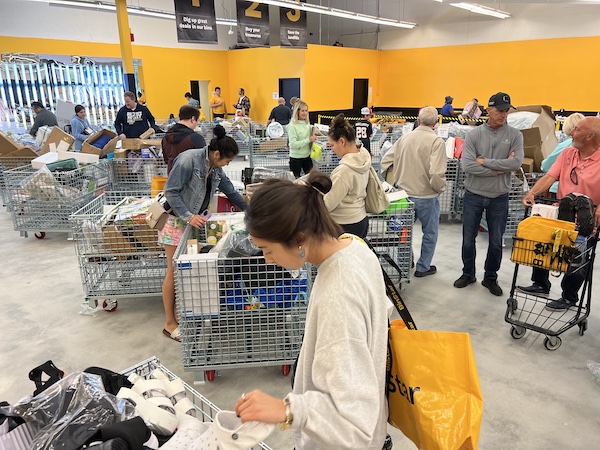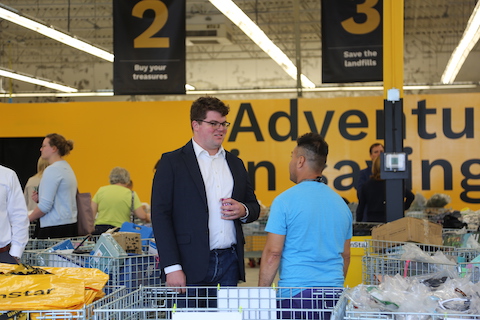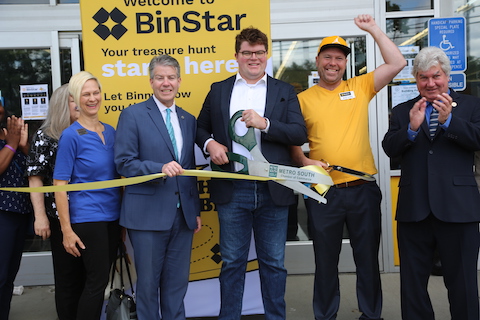
The BinStar store in Avon, Massachusetts. Photos courtesy of BinStar
When Jack Laughlin (’17) took on an assignment at e-commerce company Perch to figure out the best way to deal with returned merchandise, he figured it was simple.
Laughlin, who was brand manager at the Boston-based company, says, “I am, like, ‘What do you mean ‘returns’? That’s if you return something, Amazon or whoever waves the magic wand, and it all goes back into the pile, and all is well.’ ”
Not so much, he discovered as he researched the project. What he learned led Laughlin to co-found BinStar, a store selling returned merchandise. The goals are to help the environment, give businesses an outlet for merchandise that otherwise would head to landfills and offer customers super deals on everything but the kitchen sink. Actually, BinStar, which opened in this summer in Avon, Massachusetts, has even sold a few sinks, too.
Laughlin, who double-majored in economics and German, began a career in finance at JPMorgan Chase & Co. and at Bessemer Trust in metropolitan New York before joining Perch. He and BinStar co-founder and investor Ben Weiss raised money to launch BinStar.
The resale of returned merchandise that costs retailers too much to restock is a concept popping up regionally and is ripe for growth, Laughlin says. Returned goods cost retailers, including Amazon, nearly $816 billion in 2022, according to a study by the National Retail Federation and Apriss Retail. Transportation and packaging for returns added about 24 million metric tons of carbon dioxide emissions that year, and 10 billion pounds of merchandise ended up in landfills, says Optoro, a returns technology company.
BinStar sells landfill-bound items ranging from electronics — AirPods, virtual reality goggles, iPhones, bluetooth speakers, Nintendo and Xbox games — to household and sporting goods. On Saturday every item starts at its highest price, $19, then drops by a few dollars each day to $2 on Friday and $1 after 4 p.m. Friday. The store doesn’t skim off any items to sell separately for a higher price.
Managing Editor Carol L. Hanner talked with Laughlin about his journey to entrepreneurship. Excerpts of the conversation have been edited for brevity and clarity.

What was your early career like?
It feels like finance in New York and Wall Street is the destination for (many of us in business). Someone in our analyst class described us all — and it’s really apt — like insecure overachievers. I was an insecure overachiever. I was, like, “Let’s try finance.” I really enjoyed thinking about business models and ideas and seeing them play out in markets. I was pretty miserable but built a relationship with my co-founder (Ben Weiss, head of BinStar growth, an investor and owner of SF Holiday Lights in California). We both loved going to this Korean spot (a restaurant in Boston). We just talked about interesting business models and became good friends.
How did you come up with BinStar?
Fast forward a few jobs and a few years. I’m in Boston, and Ben (Weiss) is from Boston. (Laughlin describes his return merchandise project for Perch.) I found out pretty quickly that … returns are a nightmare in retail, whether it’s a brick-and-mortar retailer or e-commerce. Returns are a big problem, both financially and (with) logistics and, perhaps most importantly, environmentally. The stat we tell is about $250 billion worth of retail returns every year end up in the landfill for more or less no good reason.
(He began doing research online, with the skills he learned at Wake Forest and with the help of his wife, Sophie Leveque (’16), a librarian at Boston Public Library, who majored in communication and English at Wake Forest.)
Transportation and packaging for returns added about 24 million metric tons of carbon dioxide emissions in 2022, and 10 billion pounds of merchandise ended up in landfills, says Optoro, a returns technology company.
What did you find in your research?
I found this quirky concept down South, not really branded, just an empty space with some boxes of stuff in it. I was, like, “That’s returns.” I naively thought, “Well, let’s find the Target of this concept and go to them and partner with them to sell off our returns (at Perch).” I looked high and low, and the was no Target of this concept.
Eventually it started driving me crazy, and I ended up quitting my job and raising a little bit of money and putting this together. And now we have BinStar.
If you would’ve told me as a freshman at Wake Forest that I would be starting a quirky brick-and-mortar retail concept in Boston, I don’t know if I would’ve believed you, but here we are.
What excited you most about this idea? The environmental impact? The market possibilities?
All of the above; (as a concept) this is the negative-calorie cheesecake.
It’s getting awesome products — Apple watches, laptops, hunting supplies, home goods, diapers, everything — (that) people are used to paying full price for to customers who want them at prices no one else can touch — in a really fun way. It’s the marriage of the money side, the environment and the customer experience all coming together to create something that doesn’t exist, which is exciting.
The testament to it is that people will line up before we open on a morning to be first in line to have their first bite at the apple, which is just really rewarding to see that people are willing to wait in line to give us money.
I also feel like you get to work with really awesome people … that I would not meet otherwise and have really awesome relationships with, whether they’re employees or suppliers. Like, we’re friends with our landlord.
What’s really cool is that when you give people a piece of ownership in what they’re working on, and you treat them well and promote them to chase ideas that they have, one, they’re really loyal; two, they have a lot of fun working with you; and three, they tell all their friends about it.
You’ve chosen to do employee ownership sharing. Explain why you chose that model.
One, it’s the right thing to do. If you’re asking people to sweat for your livelihood and financial security, they should have a piece of the pie, too. That should be a standard. But especially in retail, the annual turnover for associates is about 90%. It’s very high, and retail is also one of the largest sectors in the economy from an employment perspective.
So just treading water as a retail employer is very expensive because most folks are constantly hiring, training, onboarding, offboarding, tracking down, and it’s a lot of money.
I like to think I’m a nice person and want to do right by people, the values I learned at home and at school and then the Boy Scouts. (He was an Eagle Scout.) I would feel icky if I was trying to pay people minimum wage and no benefits.
What’s really cool is that when you give people a piece of ownership in what they’re working on, and you treat them well and promote them to chase ideas that they have, one, they’re really loyal; two, they have a lot of fun working with you; and three, they tell all their friends about it. We have 15 associates right now, and we’ve had one leave in six months, and that was for a medical reason.
The punchline I tell folks is that the employees have to come first because we can find hundreds of thousands of people that would come buy a laptop or an Apple watch. But it’s really hard to find more associates, and it’s really expensive to find the right ones.

The ribbon-cutting for BinStar's opening
What brought you to Wake Forest from your hometown of Dallas?
(I was) on a tour of the East Coast … because I wanted to leave Texas because, of all the things I dislike in the world, being hot is one of them. North Carolina isn’t quite as cool as it could be, but I was, like, “Let’s check out Winston-Salem, North Carolina.” I went to the campus. I think I shadowed a couple of classes. I talked to some professors and was, like, “Oh, this is really cool. I like this a lot.” (It) ended up being an awesome decision.
Why did you choose economics and German as your majors?
Economics is a great way for folks like me who are interested in about everything but aren’t interested in one thing so much (that) they just want to do that. You can learn about how anything works, whether it’s business models or international relationships or even the economics of being an artist. I did well in it and loved it.
Then German, I needed to pick a language, and I did four years of high school Latin and was done with taking Latin. In my first year seminar, I had an awesome professor, Chuck Thomas (P ’04, ’12) in the history department, and he taught a class on the First World War. His wife (Rebecca Thomas P ’04, ’12) was in the German department. She really encouraged me to take German. I’m actually pretty decent at German, and it’s a cool department, and I could go to Vienna (for study abroad at Wake Forest’s Flow House), so that’s cool. There was no master plan, but there so rarely is.

Green hoses galore on this day at BinStar
What do you see as the growth potential for BinStar?
When supermarkets started happening in post-World War II in the ’50s, there were dozens of different local regional players that consolidated, consolidated and consolidated. … I’d say that’s where the (return sales) business is going. We certainly hope to be one of the large national scale players that emerge.
(The supply side is fragmented despite a few concentrated supply sources, he says.) But there’s opportunities right down the street, too (with nearby stores that need to dispose of inventory.)
The lightning in the bottle here is the product we’re selling isn’t really the actual products. It’s that experience you have being a kid on your birthday or Christmas or whatever the special holiday is for you and, whether you’re 25 or 50 or 9, being transported back to being a kid again, … having that smile and warm feeling of excitement and possibilities. It’s a lot of fun. … No matter what you do in entrepreneurship, the whole business is storytelling.
The lightning in the bottle here is the product we’re selling isn’t really the actual products. It’s that experience you have being a kid on your birthday. … It's a lot of fun.


